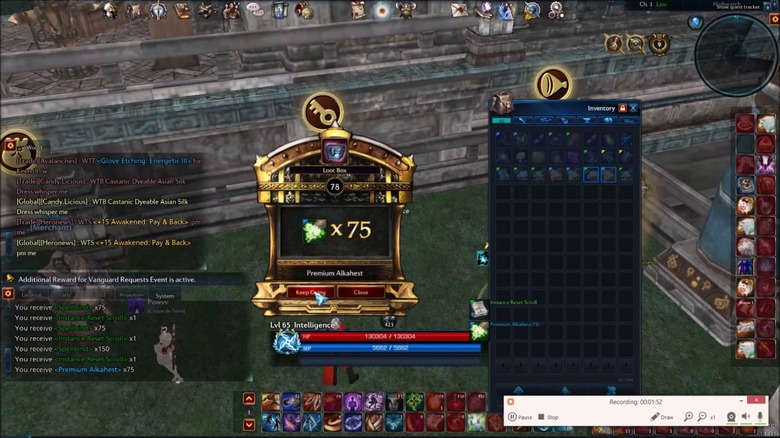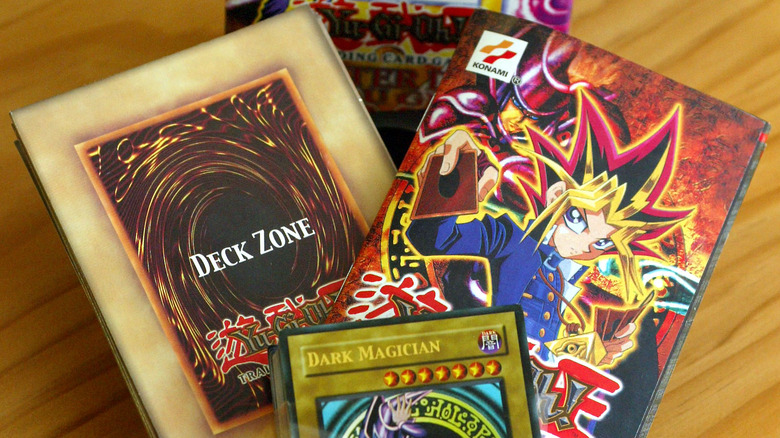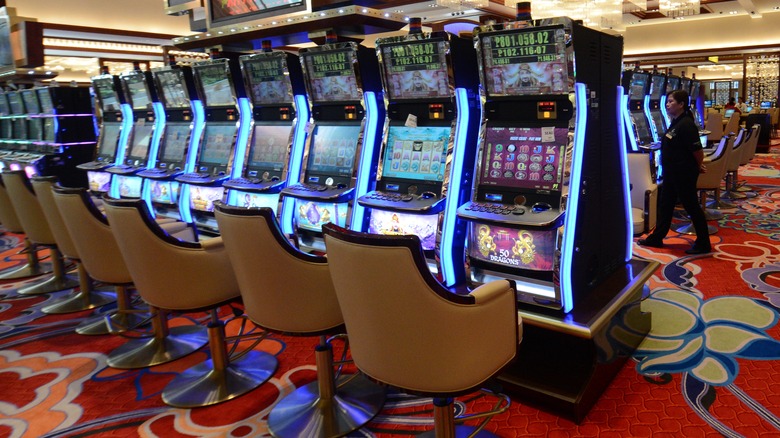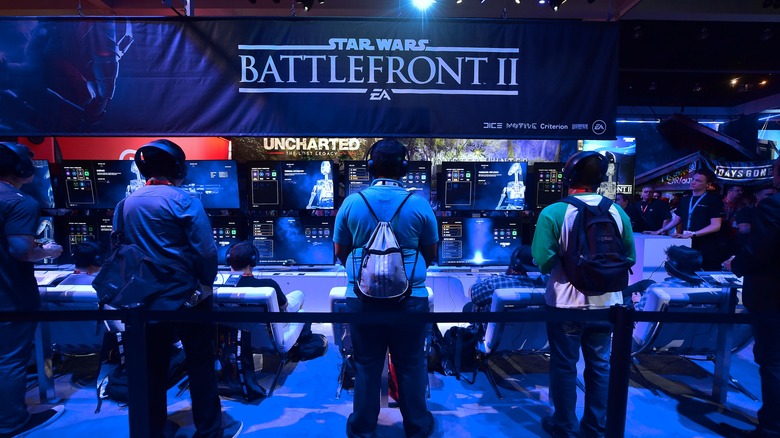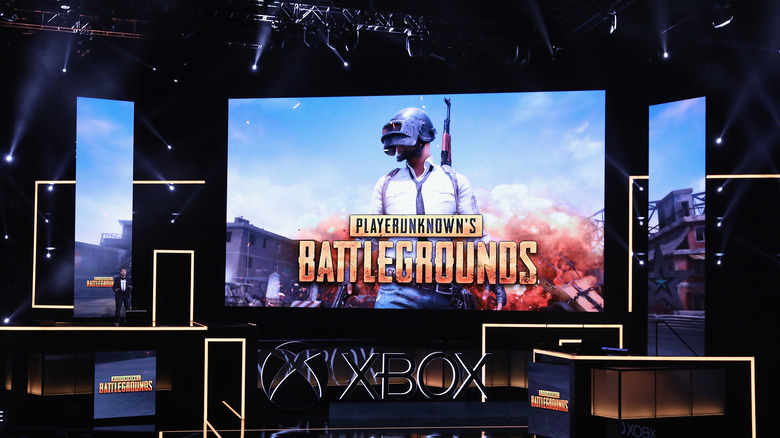The Untold Truth Of Loot Boxes
The video games we play have changed drastically since the cartridge days. Back then, once a game hit store shelves, that was its final form. There were no day-one patches to fix bugs, or downloadable expansion packs to add more gameplay: what you bought was what you got.
Boy, how times have changed.
Today's games are ever-evolving thanks to the power of the internet. Large-scale multiplayer games connect us to hundreds of thousands of other players, ensuring every time we hop into our favorite titles, we experience things a little bit differently. And that connectivity, along with built-in storage, helps developers issue fixes to problems that creep up in their games.
These online services come at a price, though, and many game companies have turned to microtransactions to fund their "live" development teams. And while microtransactions can certainly add to a game and let players create unique characters, one microtransaction type in particular gets a lot of flack: loot boxes.
We're here to tell the story of loot boxes: where they came from, how companies use them, why they're such a hot topic of debate in the gaming community, and some of the scrutiny they've come under not just from gamers, but from government entities as well.
Let's get started.
We have a Chinese MMO to thank for modern-day loot boxes
A lot of gamers might point to mobile free-to-play games as where microtransactions really began to take off. Some of those titles did, in fact, include some loot box-like elements and a gameplay loop that promoted paying real-life money in order to progress more quickly. But as it turns out, loot boxes were born far before we saw games like Clash of Clans or its ilk on our iPhones. In fact, loot boxes can be traced back to 2006, the year before iPhones even existed in the wild.
The now-infamous loot box is credited to an MMO (massively-multiplayer online) game called ZT Online. The game, according to a book called Red Wired: China's Internet Revolution, included "virtual treasure boxes, which may contain in-game items worth more than the cost of the box itself." Sounds a lot like a modern-day loot box, doesn't it? Many games with loot boxes adopt the exact same system for their items, filling them with items that at least meet the perceived value of their price, but sometimes tossing in an extra-special piece of content that is actually more valuable.
Thanks, ZT Online!
Loot box defenders say they're no different than other chance purchases
Not everyone hates loot boxes. Game companies certainly seem to love them; after all, we've been seeing quite an influx of them in the past few years. But these randomized goodie boxes also have their defenders in games media and in the gaming community at large.
Many see loot boxes as nothing more than the 21st-century equivalent of trading card packs. When you open up a pack of baseball cards, or a pack of Yu-Gi-Oh! cards, for example, you're not entirely sure what you're going to get. You could get some common cards you haven't collected before. You could get some cards you already have. Or you could potentially get some highly rare and valuable cards that, if sold, would fetch you more than you actually paid for the pack.
But being able to sell the goods you've purchased is the difference. Should you come across some cards you don't want, you're more than free to sell them at market value. You can't always do that with the digital goods you find inside a video game loot boxes. In the majority of circumstances, you're stuck with what you get, and you have no way to recoup any of the cost.
Loot box opponents believe loot boxes are designed to be predatory
You may have read a news story or two about a parent who gets an unexpectedly high mobile phone bill. Their bill, which might come in somewhere around $100 a month, suddenly balloons up to thousands — or even tens of thousands — of dollars, and they're completely unsure why.
After a bit of investigative work, they locate the source of the charges: a child who has purchased a lot of loot boxes and other microtransactions in a mobile phone game.
Those who oppose the inclusion of loot boxes in games feel that they're built to do nothing more than take advantage of gamers, both young and old. They say these boxes are designed to bring out our addictive tendencies and get us to spend more money than we should. Look at any video game with loot boxes and you'll notice that, in most cases, a big show is made every time you get to open a box. There are sometimes explosions, fireworks, and celebratory music. Your loot jumps out of the box and — let's be honest — looks awesome.
But once the box opening ends, loot box opponents argue, you're left wanting more. Especially if you didn't get the thing you wanted.
Loot boxes are considered by some to be gambling
The addictive nature of loot boxes is a lot like another activity some partake in: gambling.
The next time you're in Vegas, take a swing by the slot machines and you'll find folks who have lost money, have broken even, or have won money but still feel compelled to play and win more. If every single person who profited off of a slot machine walked away with their winnings, a lot of casinos would probably go out of business. But it's the simple act of playing that gamblers get their rush from. The money, it seems, is almost secondary to the feeling they get of taking a risk. Will it pay off? Will they win? Or will they lose? They put another quarter in because they're dying to find out.
You'll find people who spend a lot of their money on loot boxes and get that same feeling from opening them. The only difference? "Winning" doesn't mean they've hit the jackpot and listened to thousands of coins spilling out of a machine. Winning is getting an emote that is hard to find, or getting a skin that not a lot of other players are using. And if they don't get what they want, they pull the lever one more time and buy another loot box.
In 2017, loot box inclusion became a huge debate in video games
Overwatch was one of the first PC and console video games to bring loot boxes into the mainstream. The game itself is a multiplayer-only affair, which means that, in order to keep players interested and playing, it needed a draw — something that players could work toward and achieve so that they had a way to set themselves apart from others.
In Overwatch's case, the solution was loot boxes full of emotes, skins, graffiti tags, voice lines, and more. And the system was implemented brilliantly. Overwatch's loot box system, combined with great gameplay, turned the game into an instant classic and got a lot of other game creators looking in Blizzard's direction.
That's how we got 2017: the year of the loot box.
Loot boxes showed up in games they'd never existed in before. And if there weren't loot boxes specifically, there were loot-box-like concepts used in game modes that were designed to encourage spending. It wasn't long until gamers started to raise hell about the number of loot boxes they were seeing in lots of major titles, and their ire stirred up a serious debate in the industry about whether these boxes were a good thing or a bad thing.
The jury is still out on what the answer actually is.
There are a number of ways loot boxes can be implemented in games
Not all loot box systems operate in the exact same way, so it can be confusing at times when gamers and some media types take issue with loot box reward systems. One could look at the aforementioned Overwatch loot box setup and say, "I have no problem with this! It's all cosmetics, and the game provides an in-game currency so you can buy the things you want if you play enough." But that particular system doesn't apply to all games, and some include loot boxes in a way that can feel less fair.
Some games, like Rocket League, drop random items upon a match completion so that there's a chance of getting a cool item. But most matches also end with a player receiving a loot box. The hook? You can't open the loot box without a key, and the key will cost you real-life money. Other games, like those in the Madden series, offer digital card packs for in-game custom teams. The cards unlock players that can be used on a team, and there are certain card packs you can buy that offer higher odds of getting better players — packs that aren't obtainable if you don't spend money.
You'll find plenty of spins on the base loot box formula across all types of different video games. It's up to you to decide how intrusive they are in the games you play.
Loot boxes nearly sank several games
We've already discussed about how 2017 felt like the year of the loot box, and for some games, including these boxes did not go well.
Take Star Wars: Battlefront II, for example. EA decided that Battlefront II would lean heavily into loot boxes for its Star Wars shooter, but unlike a lot of games that keep rewards confined to cosmetic items, Battlefront II took things to the extreme. Playable characters suddenly became loot box rewards in the title, along with more powerful weapons and other upgrades, and Battlefront II's loot box system quickly got the label of "pay to win" from the gaming community.
Middle-earth: Shadow of War also hopped aboard the loot box train in 2017, and what was originally a highly-anticipated title suddenly found itself in the line of fire not only from gamers, but from reviewers who found the inclusion of loot boxes in a single player game bizarre.
Both of the above titles eventually caved to the pressure put on them by gamers, either revamping their rewards systems or doing away with loot boxes entirely.
But loot boxes haven't necessarily hurt the popularity of other games
With the hostility directed toward loot boxes by many gamers, you might believe that most games that include them suffer as a result. But that couldn't be further from the truth. In fact, there are some games that make a lot of dough from loot boxes and seem to get a pass from their fans.
Again, one only has to look at Overwatch to see that loot boxes aren't necessarily a kiss of death for a title. Overwatch has moved millions of units and generated $269 million in its launch month of May 2016 alone. PlayerUnknown's Battlegrounds is another hot-selling title despite its loot boxes, surpassing 30 million copies sold on PC.
It can be easy to get caught up in the furor surrounding loot boxes and the way they're affecting the games we play. But based on the above-mentioned games, the hate for loot box reward systems isn't applied evenly to all titles.
At least one country has banned loot boxes
The United States doesn't always act as quickly as other countries when it comes to regulation, and in no space is that more apparent than with loot box systems. Countries like Belgium, for example, have ruled that, in some instances, loot box systems amount to little more than gambling inside a video game. And they've implemented new rules to outlaw these types of loot boxes to keep consumers protected and keep games from taking advantage of those who might be tempted by digital loot box goods.
Games like Overwatch, FIFA 18, and Counter-Strike: Global Offensive were found by Belgium to be violating the country's gambling laws. As a result, these titles were instructed to remove their loot box systems or their respective publishers would "risk a prison sentence of up to five years and a fine of up to 800,000 euros."
And Belgium wasn't alone in its fight against loot boxes. The Netherlands joined its neighboring country, asking the European Union to consider EU-wide loot box legislation.
Loot boxes are under fire in the US
In the US, the battle against loot boxes hasn't seen much action in the contiguous 48 states. But one Hawaiian legislator has made regulating loot boxes his personal mission, and has helped push the issue in the Hawaiian State House of Representatives.
The bill Rep. Chris Lee co-sponsored reads a lot like the arguments others have been making against loot boxes for a while. It states: "Unlike traditional card games or other games of chance, the ubiquitous reach of video games which require active, lengthy participation and exposure to the psychological manipulation techniques of exploitive loot boxes and gambling-like mechanisms presents potentially harmful risks to the financial well-being and mental health of individuals and especially of vulnerable youth and young adults."
It remains to be seen if the Hawaiian loot box bill will gain any traction, both in its state of origin or in the country as a whole. But the mere existence of legislation against these types of game systems in the US shows that the backlash has extended beyond the gaming community and into the world at large.


